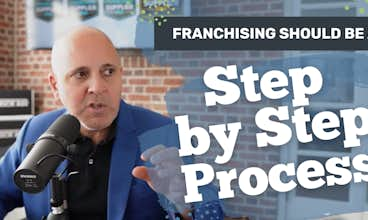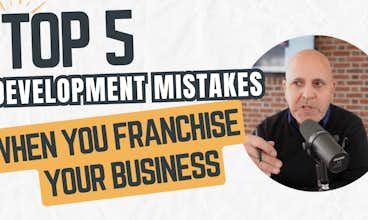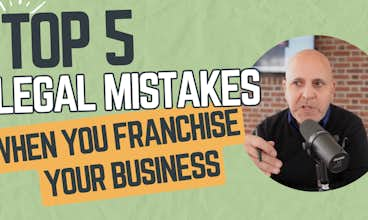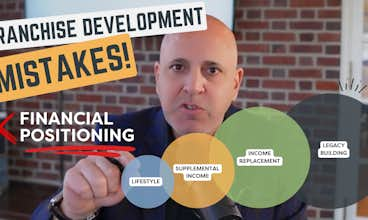Learn about the common mistakes every new franchisor should avoid
Within the franchise industry most new franchisors fail to gain traction and get frustrated with the franchise sales process. There are many entrepreneurs and successful business owners that consider franchising their business and building our a franchise system that recruits franchisees that help expand a brand. But why do the majority of new franchisors fail and what is the difference between the franchisors that succeed in selling franchises and those that dont?
These are the 9 reasons why most franchisors fail:
- They Don't Define Success
- They Don't Have a Strategy for Success
- They Don't Understand What Comes After Issuing their FDD
- They Don't Have a Franchisor Mindset
- They Don't Have a (real) Operations Manual
- They Don't Know Their Leads
- They Don't Stack Up Against the Competition
- They Don't Have a Consistent Sales Process
“When I have conversations with [my] clients, I tell them, ‘Look, when you franchise your business, you're gonna be at a high point. You're gonna feel like things are good – you've got your FDD (Franchise Development Document). And that's really just a starting point. Where the success is going to come from is weathering that storm – because you're gonna have a ton of low points. You need to keep digging and building,” says Charles N. Internicola, a franchise attorney and the founder of The Internicola Law Firm, a nationally-recognized law firm that specializes in franchise law.
Below, we explore nine of the most common reasons franchisors fail – and what you can do to ensure your franchise is successful over the long term.
1. They don't define success
One of the more prevalent reasons franchisors fail is that they don’t take time to define what success looks like for their brand – a definition that is often as unique as the franchisor and the business itself.
“What does [success] look like for you? Are you trying to become a household name with 500 locations or are you trying to just get a nice little regional franchise system going and make some friends and have some other like-minded people working shoulder-to-shoulder to grow your brand? You have to define success,” says Lisa Welko, a certified franchise expert and the owner of Integrity Franchise Group.
To define your vision for success, Welko advises considering your values as a franchisor to determine whether you want to spend the next several years developing a large-scale national franchise system or a smaller chain that’s more focused on local engagement. By defining success on your own terms as a franchisor, you can build your brand around your personal goals while establishing a timeline of milestones that align with your vision of success.
2. They don't have a strategy for success
Once you’ve defined what success looks like for your franchise, mapping out a path to achieve it is critical. Without charting a path, it can be difficult to know where you’re going as a new franchisor. Still, one of the more common reasons franchisors fail is that they don’t develop an incremental, milestone-based success plan.
“We know what success may look like – I want to grow a thriving franchise system, I want to grow nationally. … What are the time increments? What's your one-, two-, three-, five-year goal? What does success look like after your first year? What does it look like by year five?” Internicola says.
To avoid the mistake of not having a roadmap to success, Internicola advises franchisors to develop a five-year success plan. During your first year in business, plan to focus on seasoning and organically growing your new franchise. Throughout years two and three, focus on building up support, unit-level economics and validation to scale the brand. Finally, years four and five should be focused on acceleration and growth.
3. They don't go beyond the FDD
Often, new and emerging franchisors make the mistake of believing that having a Franchise Disclosure Document (FDD) is enough to sell franchises on its own – a misstep that could be costly in the long run.
“You can't just have an FDD and think everyone's just going to call you. I mean, it just doesn't work that way. You have to go to war for those first 10 franchisees – you've got to do everything in your power to cut through the noise,” Welko says.
Instead, as a new franchisor, you should create a strong marketing and recruiting strategy that will attract well-qualified franchisee candidates as early as possible. Even after selling your first few franchises, however, it’s important to continue positioning your brand for franchise sales.
“We have our FDD – that's just the starting point. You want to make sure you come out of the gate the right way, you’ve positioned it the right way – right territory structures, right unit-level economics, whatever the case is,” Internicola says.
4. They don't have a franchisor mindset
Compared to running a small business, owning a franchise system is an entirely different ballgame. One of the more common mistakes new franchisors make when entering the franchising industry is continuing to think of themselves as business owners rather than franchisors.
“Your business right now is franchising. You are no longer the best roofer in the Valley or the best cupcake on the mountain. You are a franchisor of the widget – so go and learn that business, because it's not the business that you thought it was,” Welko says.
To avoid the mistake of operating your new franchise with the same mindset you had as a small business owner as a new franchisor, it’s important to remember to adopt a growth-based mindset by focusing on scaling your brand while putting all of your efforts into supporting the success of your first franchisees.
5. They don't have an operations manual
Maintaining consistent brand standards across all franchised locations is one of the most important aspects of operating a successful franchise. As the blueprint for the entire franchise system, having an operations manual is critical for success. Unfortunately, franchisors often fail to develop this important document early on.
“I'm a big believer in the operations manual. … It shouldn't be a book. It should be, over time – like franchisee three – a series of videos, a series of tutorials, a series of quizzes, all the pain points you learned from franchisees one and two. By franchisee 10, it’s an amazing experience,” Internicola says.
Although operations manuals are typically as unique as the franchise they belong to, it’s important to follow best practices when drafting your operations manual to ensure it covers all of the important topics that franchisees will need to refer to in their day-to-day operations. Often, the topics covered in a franchise operations manual include confidentiality and legal notices, brand and team introductions, development strategies, training and how-to guides, operating systems and requirements, marketing and business development guidelines, and other important information specific to the franchise and its industry. Over time, the manual can be updated to reflect changes in policies and operations as the franchise grows.
6. They don't know their business
As a new franchisor looking to sell franchises and scale your brand, having the ability to speak knowledgeably about your franchise system is necessary for success. Despite that fact, a common reason franchisors fail is that they don’t know enough about their business to convince others of its value – especially when it comes to working with franchise brokers.
“When brokers are quizzing these emerging brands, we tend to know what we're looking for. So you have to know your numbers. You have to know your unit economics,” Welko says.
To avoid the mistake of looking like you’re not familiar with your brand’s numbers and figures, Welko advises franchisors to review their FDD in-depth and memorize the economic, financial and other information that are critical for franchise sales. In particular, Item 6, Item 7, and Item 19 of the FDD are especially important to brokers due to their ability to demonstrate the estimated fees, initial investments, and financial performance representations associated with the franchise system – details that can help brokers and candidates determine whether the franchise brand is a good match for their goals.
“Know your numbers. Know that FDD. I mean, I know a franchise attorney wrote it for you and you paid 1000s of dollars to get it written, but you need to know the answers. They need to roll off your tongue, because that is the expectation,” Welko says.
7. They don't invest in leads
To achieve success in the franchise industry, having well-qualified and ambitious franchisees is critical. Because of that, quality is often more important than quantity when it comes to selling franchises. Often, franchisors fail because they didn’t invest enough in the highly-qualified leads they could have received if they’d worked with a franchise broker.
To avoid this mistake, new franchisors can work to develop relationships with franchise brokers early on. After you’ve sold your first several franchises and over-supported your franchisees to achieve validation and success, it can be worthwhile to start working with a high-quality franchise broker that can connect you with other validated, highly-qualified candidate leads.
Before taking that step, though, it’s important to make sure your franchise is running properly and that your success is verifiable and easy to demonstrate to brokers and candidates to establish trust during the sales process.
“[Brokers are] spending money on leads, qualifying candidates, building a relationship that they're going to honor. And so they need to have trust in your brand and your process,” Internicola says.
8. They don't stack up against the competition
Often, franchisors don’t take time to evaluate their brand against other similar businesses in their industry – a mistake that can be detrimental when it comes to franchise sales and longevity.
“You're in the franchise game, so every other franchise at your price point is your competition,” Welko says.
To avoid falling behind competitors in the franchising space, take steps to competitively position your FDD and franchise system to ensure your brand’s value can be easily recognized by brokers and prospective franchisees – even when comparing your brand to competitors.
“[Business is] harder than ever and so my message for our clients always is, let's outmaneuver the competition. Let's not follow what all the other brands are doing,” Internicola says.
To make sure your FDD is positioned competitively, rely on your franchise system’s metrics and benchmarking (the process of evaluating your franchise’s operations, performance, and estimated initial investment metrics against those of your competitors) while differentiating your products, services and brand story from other similar businesses.
9. They don't have a consistent sales process
When it comes to selling franchises, having a streamlined sales process can create an air of professionalism that sets your franchise apart from competitors. Unfortunately, many franchisors often fail to develop such a process – a mistake that can potentially result in lost sales and bad impressions.
To avoid having a messy and inconsistent franchise sales process, it can be a good idea to define your ideal franchisee and then develop your sales process around attracting and recruiting candidates aligned with that vision.
“Know what that [ideal] franchisee looks like – who you're looking for to walk shoulder-to-shoulder with you. I know that the person, no matter what, is going to be able to take risks. I don't care how strong your franchise is. If you have less than 10 units, it's risky,” Welko says.
Beyond making sure you’re attracting the right franchisee candidates, it’s important to make sure your sales process is easy to follow and offers candidates all of the information they need to make an informed decision about investing in your franchise system. Often, that process starts with a simple phone call.
“[Schedule a] nice introduction call. And then you're going to follow them up with one or two videos about your brand that they can watch on their own time, share with their spouse and still get information about the brand,” Welko says, noting the importance of following up with candidates and answering any questions they might have about the franchise. Although some franchisors incorporate nondisclosure agreements into their franchise sales processes, Welko advises against the practice.
Once a franchisee candidate has been offered the preliminary information needed to understand the brand, franchisors should deliver the FDD to the franchisee candidate within the legal FDD disclosure period – a step that is required under the Federal Trade Commission (FTC)’s Franchise Rule before the sale of a franchise.
“You might do some recorded validation calls and then just set some time aside, maybe once a week, for that person to be on the phone for an hour. Have a group call, whatever that is, but you've got to always follow up, tell them what they've learned, tell them what they're about to learn, hit the high points given to the next stage, because that's what everybody else is doing,” Welko says.
Beyond legal compliance, having a consistent franchise sales process in place also offers the benefit of giving candidates and brokers the impression that your emerging brand is on par with much bigger companies – something that can be a valuable asset when it comes to selling franchises early on.
“If you're competing against the big FSOs (franchise sales organizations) or bigger companies, that's what they're doing. … And so you need to be doing it – you can't look small,” Welko says.
Watch the full interview below:







